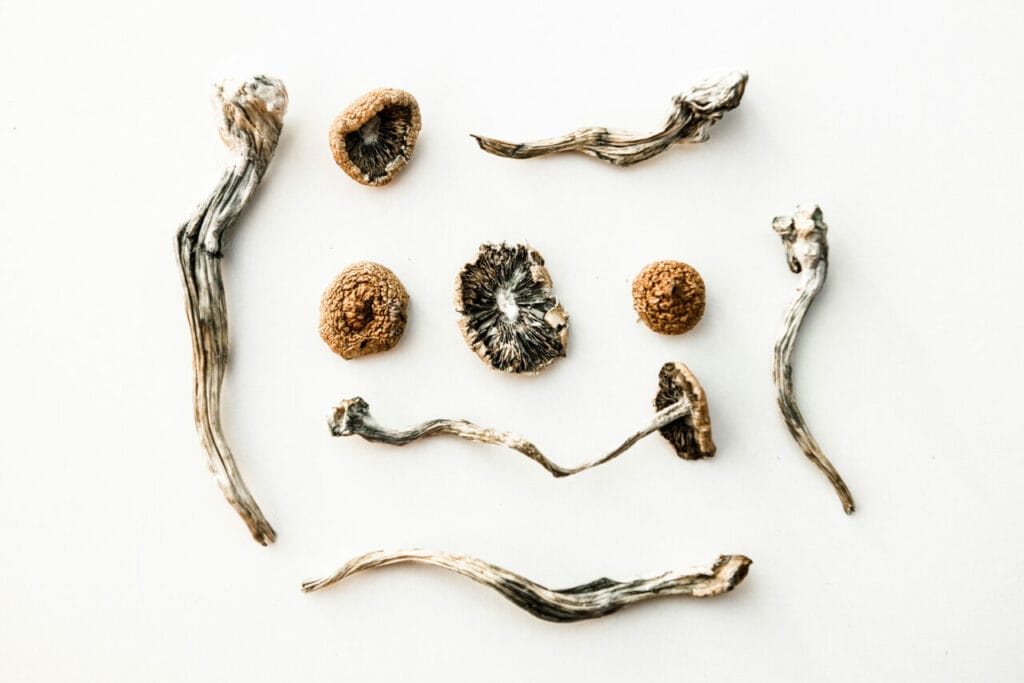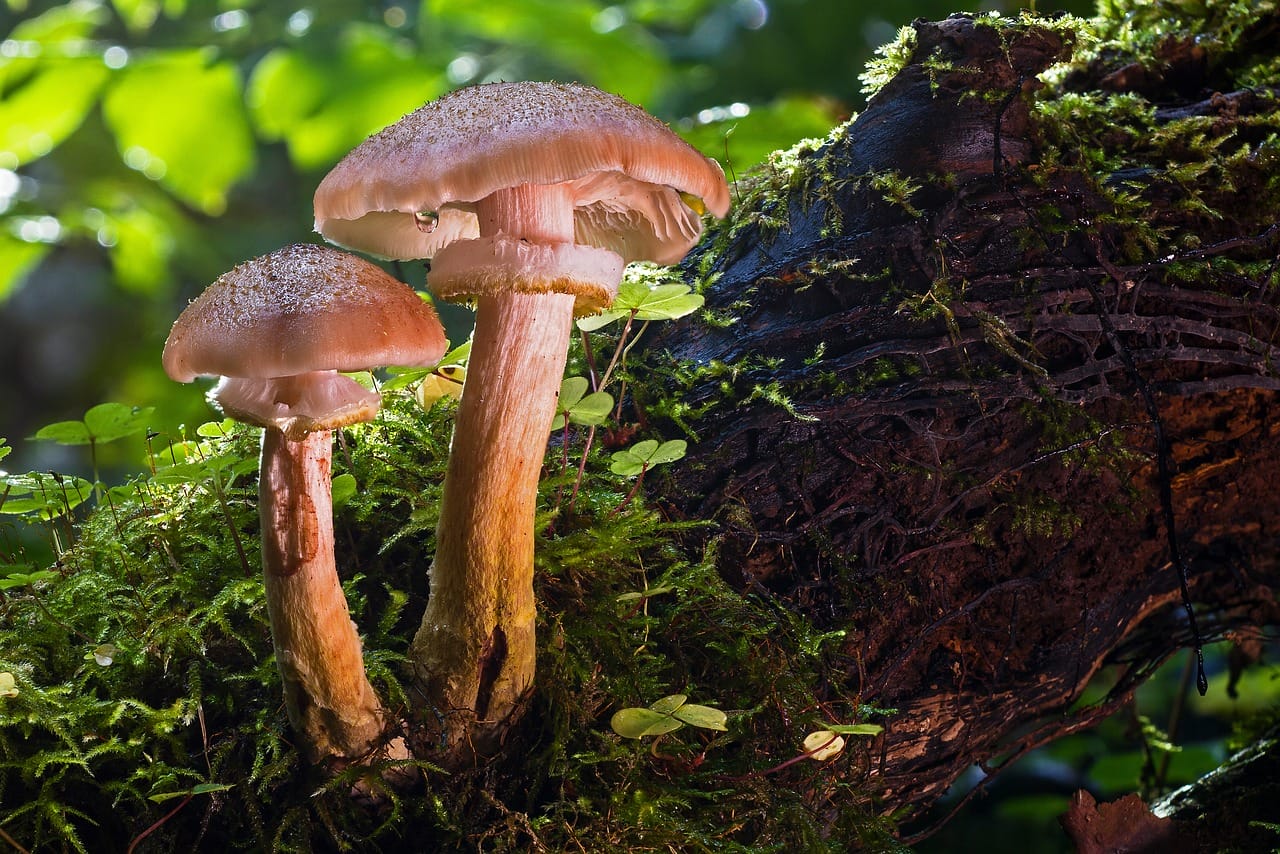Initially, many Canadians viewed magic mushrooms merely as a psychedelic substance for recreational use. However, this perception changed when scientific studies on the active ingredient, psilocybin, revealed its strong effectiveness in treating several mental health conditions.
With the continuous availability of new data, our understanding of psilocybin’s potential uses continues to grow. The more we know, the easier it becomes for people to access these products through magic mushroom delivery services. A recent study has shed light on its influence on human consciousness. Could this be the key to its substantial impact on the human brain? Let’s further probe this fascinating study of magic mushroom products.
Main Takeaways:
- Psychedelic magic mushrooms have played a role in the cognitive evolution of early humans, contributing to their survival.
- Mushrooms significantly contribute to neurological health due to their ability to mitigate PTSD, depression, and anxiety.
- Psilocybin’s influence on consciousness and brain activity could potentially enhance creativity, self-reflection, and abstract thinking.

Magic Mushrooms: Historical Usage and Significance
Historical evidence indicates that our ancestors have utilized the potent effects of psychedelic magic mushrooms since ancient times. Indigenous societies incorporated them into sacred rituals and traditional ceremonies as a form of homage to their gods. These mushrooms are found worldwide, particularly in subtropical and tropical areas, including South and Central America, the Caribbean, Southeast Asia, and Africa.
The Influence of Shrooms on Ancient Civilizations
Indigenous groups in Mexico have relied on these fungi for spiritual enlightenment, divine interactions, and religious ceremonies since time immemorial. The Aztecs of South America called it “God’s Flesh” and used it in healing rituals.
The evidence of usage found in archaeological records dates back to:
- Approximately 10,000 years ago in Australia
- Close to 7,000 years ago in North Africa
- Roundabout 6,000 years ago in Spain.
Many researchers interpret these findings as evidence of the widespread historical consumption of psilocybin. As individuals ingested these mushrooms, they experienced a euphoric state, hallmarked by complex geometric and visual hallucinations.
The Significance of Mushrooms in Spain’s Bronze Age Narrative
During the mid-1990s, scientists discovered remnants, specifically hair strands from approximately 200 Bronze Age communities, hidden within a cave in Minorca, Spain. The artifacts were incredibly well-preserved, due to the cave’s entrance being sealed by fallen debris. The analysis revealed that these hair samples contained traces of three alkaloids, substances recognized for their ability to alter the human mind and induce different states of consciousness.
These discoveries provide intriguing evidence into the reasons and methods ancient societies used these substances. Surprisingly, reaching a heightened mental state was actually quite typical during these periods. However, the question persists, what influence did these substances exert on human evolution?
Psilocybin and the “Big Bang Theory” of Human Consciousness Evolution
Recently, there has been a renewed interest in psychedelic research, reaffirming the belief that psychedelics contributed to the evolution of consciousness. This idea, also known as the stoned ape theory, was proposed by ethnobotanist Terence McKenna. The theory proposes that psychedelics may have influenced the cognitive and cultural evolution of humans.
According to Dr. Thomas Falk, a Philosophy and Education professor at the University of Dayton, this theory might potentially explain the so-called “creative explosion” that happened amongst Homo sapiens around 40,000 years ago, signifying a remarkable advancement in early human cognitive skills.
It’s theorized that psychedelics allowed early humans to dwell in self-created worlds. Over time, their enhanced cognitive abilities allowed them to replicate these experiences in their physical environment.
In Terence McKenna’s “Food of the Gods“, he put forth arguments stating that the stoned ape hypothesis has its foundation in ancient shamanistic rituals and a speculated range of plants and fungi.
“Ability to Trigger Neurological and Psychological Transformations”
Psychoactive substances possess the potential to induce deep neurological and psychological transformations. These changes might have played a crucial role in the progression of our species.
This study, which draws upon a variety of disciplines including biology, ethnobotany, and neuroscience, critically examines current research surrounding psilocybin and its effects on human consciousness. The theory suggests that as early human populations transitioned from forest to grassland habitats, their exposure to animal dung—and consequently, these fungi—increased. The “stoned ape” hypothesis proposed in the study implies that this dietary adaptation may have triggered significant neurological changes in early hominids.
Potential Effects of Psychoactive Substance Consumption
The possible outcomes of consuming these fungi might include superior hunting and scavenging skills, heightened sexual drive, and increased sensory perception. Coupling these potential effects with the known impact of psilocybin on consciousness and brain functionality, it’s plausible that such factors may have stimulated creativity, introspection, and abstract thinking, all of which are key elements in the development of language.
The Peruvian scientists behind the study emphasize the need for further exploration into the effects of these substances on brain health and human evolution. Despite their influence on areas of the brain responsible for memory, decision-making, and introspection, the evolutionary implications remain an active area of research.
Separate genetic research suggests that magic mushrooms emerged around 67 million years ago, and human consumption began millions of years ago, predating the use of marijuana.
What are Dried Magic Mushrooms?
They contain a hallucinogenic substance called psilocybin. The effects can vary based on individual tolerance, body weight, and method of consumption. Here are some of the expected effects:
- Profound joy
- Feeling of tranquility
- Spiritual enlightenment and introspection
- Experiencing a dreamlike state of being disconnected from one’s physical environment
- Modified visuals, such as seeing auras of light and vibrant colors
- Enhanced sense of well-being
Although it is commonly used recreationally, many people also take advantage of its medicinal properties, particularly for the positive effects it can have on brain health.
Effects on Neurological Health
The active component alters one’s mood, perception, and cognition by engaging with serotonin receptors situated in the prefrontal cortex. This interaction enhances cognitive abilities, notably in the manipulation of visual and auditory experiences, thus augmenting task performance.
Historic Connection
This concept extends to our early ancestors, particularly the ‘stoned apes.’ As they moved from forest to grassland habitats, they discovered and began to use these fungi. This shift led to increased encounters with animal feces, inadvertently increasing their intake of these mushrooms. The study cites the “stoned ape” hypothesis, suggesting that this dietary adjustment could have instigated substantial changes in the brain structures of early hominids.
The ingestion of psilocybin mushrooms may have played a critical role in the evolution of their consciousness and cognitive abilities, potentially providing an explanation for the development of essential survival skills.
Present and Future Implications
Recent research has discovered that individuals afflicted with conditions such as cluster headaches, anxiety, anorexia, obsessive-compulsive disorder, PTSD, and depression often have reduced serotonin levels. Although selective serotonin reuptake inhibitors (SSRIs) are typically used to treat these conditions, they usually take a significant amount of time to yield improvements. In contrast, shrooms have the potential to induce immediate alterations in brain neuron connectivity.
Modern Psychedelic Research – Clinical Trials
Since the early 2000s, scientists have been exploring novel treatments for various psychiatric and behavioural disorders, tailored to individual patient requirements.
The ability of psilocybin to penetrate the central nervous system and enhance cognitive function has been proven effective in therapy. Recent research in 2020 indicates that psychedelic therapy using psilocybin products helps to alleviate severe depression.
According to Matthew Johnson, a professor at Johns Hopkins Medicine, these substances alter the way various brain systems interact. An increase in connectivity between brain regions that typically do not communicate effectively is evident. Conversely, areas that usually have high interaction levels exhibit reduced communication.
This induced disarray is not merely a side effect, but possesses therapeutic potential. Depressed individuals often fall into a loop of self-critical, repetitive thoughts that worsen their condition. Psychedelics interrupt these patterns, allowing individuals to escape from their deeply rooted negativity during a psychedelic experience. This leads to more flexible thinking and an enhanced ability to manage critical
Your Journey to Healing: Purchasing Magic Mushrooms Online
A diverse assortment of these controlled substances can be procured online. Choose from a safe and lab-verified collection, mitigating the chance of accidentally buying poisonous mushrooms. Reputable vendors ensure the quality and safety of the products they market.
| Product | Psilocybin Content | Psilocin Content | Benefits |
| Enigma | 0.76% | 0.07% | Improves Focus, Elevates Mood |
| Atlantic Treasure Coast | 0.59% | 0.08% | Boosts Concentration, Fosters Creativity, Encourages Neuroplasticity |
| Blue Magnolia | 0.58% | 0.08% | Enhances Memory, Assists in Managing Depression and Anxiety |
| Cambodian | 0.45% | 0.06% | Aids in PTSD and Anxiety Treatment, Supports Substance Abuse Recovery, Improves Mood |
Revealing the Hidden Potential of Magic Mushrooms
Today’s progress, including civilizations, urbanization, and societies, are outcomes of various evolutions. While the stoned-ape hypothesis may just be a speculative conversation, scientific researchers are steadily discovering evidence that affirms the pivotal role of psilocybin in human evolution.
If you’re in pursuit of expedited cognitive growth, Shroomland Canada’s magic mushroom delivery is your ultimate destination. We offer a comprehensive range of superior-quality shrooms from A to Z, with swift delivery service across British Columbia and beyond.
Uncover the future of self-improvement—peruse our assortment of top-tier psychedelics online Canada today.
Commonly Asked Questions
What variety of shrooms were consumed by ancient civilizations?
Various types of fungi exist worldwide, hence there isn’t a single type that was universally consumed. Some societies favored the well-known liberty caps, while others opted for Psilocybe cubensis. Most of them ingested these mushrooms in their natural form or prepared edible versions like tea infusions.
What is the role of psychedelics in contemporary human development?
Psychedelics, in our current society, act mainly by engaging the 5-HT2A receptor subtype. This interaction has proven beneficial in managing stress-related disorders and considerably affecting creativity and social interaction. These effects can enhance adaptability and resilience, especially in societies that heavily rely on knowledge and social collaboration.
Did spiritual practices involving shrooms influence human evolution?
Indeed, human evolution was influenced by spiritual practices that incorporated shrooms, as they helped shape cultural, religious, and social frameworks. They foster a deep sense of unity, creativity, and community cohesion.
Articles of Interest:





